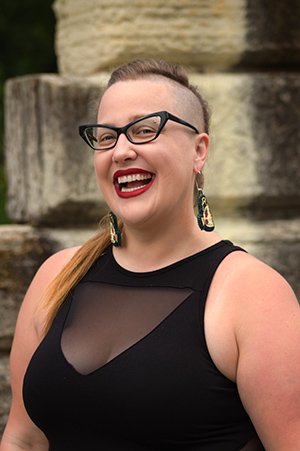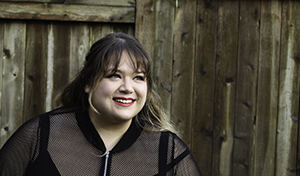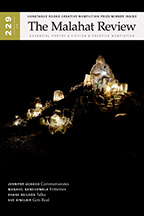The Perfect Vehicle: Francine Cunningham interviews Jenny Ferguson

Past judge and contributor Francine Cunningham talks with Jenny Ferguson, one of two Novella Prize judges for our 2024 contest. They discuss experimenting with form, the role of writing in today’s world, and how the novella has that forgotten-room-in-that-forgotten-place kind of zing.
Jen Ferguson (she/her) is Métis and white, an activist, a feminist, an auntie, and an accomplice armed with a PhD. She believes writing, teaching and beading are political acts. Her debut YA novel, The Summer of Bitter and Sweet (Heartdrum/HarperCollins) won a 2022 Governor General's Literary Award and is a 2023 Stonewall Honor Book. Jen's second YA novel with Heartdrum, Those Pink Mountain Nights, has four starred reviews so far and is a Junior Library Guild Gold Selection.
What kind of stories are you drawn to and why?
It might be a fault in my character, or it might be the human condition but I’m consistently drawn to stories that let me into the character’s hardest moments. Yet alongside that experience, I always want to be let into the characters softest moments too. Stories that manage to do both, or where in the first few pages I get the sense that the author is willing to do both—the hard and the soft, the cruel, the mean and the kind, the many sides of what makes us all human in this more-than-human world—then I’m along for the read.
What do you think the role of the novella is in fiction? What can it be used for? How is it interesting?
I’m teaching a novella writing and reading class this semester, and I loved the experience so much I’m teaching it again next. That’s the long way of saying I find the novella an incredibly exciting fictional form. It’s longer than the short story, and honestly, I hate the classic 20-page short story with a passion. It always feels like I’m missing so much, like the author didn’t let us into the world but kept us at a distance from the world. What can I say, I like depth of experience, breadth of experience. It’s the reason I’m a novelist.
But novels take time. They are so damn long. And the modern world doesn’t offer many, many of us open, unencumbered time.
The novella seems the perfect vehicle to go deep enough, wide enough while still being something that can be read in one sitting. The novella seems the perfect vehicle for experimenting with form and voice and story. It’s a weird form, unloved by big publishing—although that is changing some—and because of its weirdness, not quite a novel, more than a short story, all sorts of people who don’t fit incredibly well in the mainstream, find that the novella, this weird, excellent, exciting form, in fact, does fit.
The novella has red-headed stepchild energy, queer energy, speakeasy energy, bastard energy, ride or die energy, anti-establishment, abolitionist energy, that forgotten room in that forgotten place kind of zing.
What did you learn about your own writing by writing your winning novella “Missing”?
I think I’ve said this before, but it’s worth repeating. “Missing” is written in reverse chronological order where we begin the story after Wendy’s best friend Ida has disappeared. The form ends up being an act of hindsight, as if Wendy could, if she looked carefully, looked in a different way, figure out who took Ida and what she was doing, what she was focused on when her best friend went missing. Of course, the exercise doesn’t reveal what Wendy thought she’d find.
Writing in this form was a departure for my practice of craft. I’d played with time before, with stories that were told asynchronously but this was bigger, more structured. Writing an entire novel in reverse chronological order felt terrifying, in a bad way, too, too unwieldy. The novella, I learned, was the right size for trying out something I didn’t think I was a strong enough writer to successfully land yet.
What is the role of writing in today’s world?
I suppose this is a hopeful answer and one that exposes for you, dear reader, my soft underbelly.
Writing, at its best, when its doors and windows are wide open, inviting in many kinds of story and many, many storytellers, is a collective consciousness. It holds us to ethical standards. It asks us to ask questions instead of seeking the answer, defies the lie that there is only one. It holds up hope, this delicate, wispy, cotton-candy and necessary thing, for us.
Stories have saved me over and over—not that I think all writing that saves us must be serious writing, whatever that means. These days, what’s saving me, what is kindling for hope in my heart, it’s a bevy of sort of unhinged, boundary-challenging-and-sometimes-expanding, very happy-ever-after-rules-here-and-don’t-you-forget-it Kindle Unlimited romance novels.
What are you looking for in a winning entry?
To be surprised. The hard and the soft. The human, the more-than-human. Language that insists I take notice. Hopeful questions. Many answers.
If it helps to make any of those statements more solid my favourite novellas this semester were Becky Chambers’ A Psalm for the Wild-Built (tea monk! robot! road trip!), Sarah Gailey’s Upright Women Wanted (the “West” revisited as very effing queer! librarians as hero! road trip!), and Sarah Tolmie’s All the Horses of Iceland (horses! saga/history as story! road trip!).
I mean, it’s so obvious now. But I do love a good road trip.
And I truly can’t wait to read your take on what the novella can do.

Francine Cunningham









